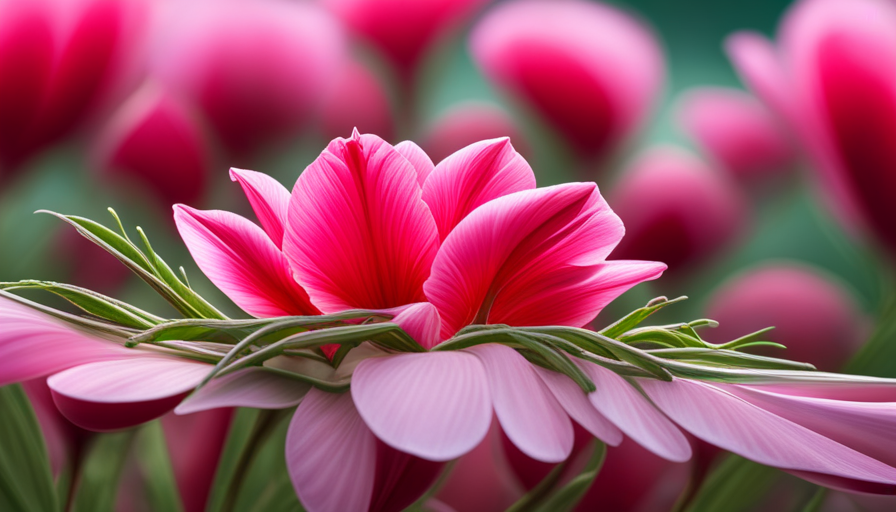Have you recently trimmed your azalea bushes and are wondering what to do with the waste? Or perhaps you’re considering adding azaleas to your garden but aren’t sure if they can be composted.
Well, you’re in luck because we’re here to answer the burning question on every gardener’s mind – can you compost azalea?
Azaleas are a popular choice for gardens due to their beautiful blooms and low maintenance requirements. However, when it comes to composting them, there is some debate. Some experts believe that azaleas can be composted without any issues, while others caution against it due to their potentially toxic nature.
In this article, we’ll delve into the composition of azaleas, weigh the pros and cons of composting them, share tips for safe and effective azalea composting, as well as suggest alternative uses for their waste in the garden.
So let’s get started!
Key Takeaways
- Azaleas can be composted safely and effectively with proper techniques.
- Azaleas should be shredded or chopped before being added to a compost pile.
- Azaleas should be composted with other acidic materials to maintain ideal composting conditions.
- Composting azaleas can reduce waste, improve soil quality, and reduce greenhouse gas emissions.
Understanding the Composition of Azaleas
You can’t just toss your azaleas into the compost pile without understanding their unique makeup – they’re a whole different ballgame.
Azaleas are known for their acidic nature, which makes them tricky to decompose. If not properly handled, they can release harmful toxins and halt the decomposition process altogether.
However, with proper attention and care, azaleas can be an excellent addition to your compost pile. Composting benefits include reducing waste, improving soil quality, and reducing greenhouse gas emissions. Just make sure to balance out the acidity of your azaleas with alkaline materials like eggshells or lime and chop them up into smaller pieces for faster decomposition.
Pros and Cons of Composting Azaleas
Although azaleas can add nutrients to your garden, they may also introduce harmful toxins into the soil. This is because azaleas contain grayanotoxins, which are found in all parts of the plant and can cause a range of negative effects on humans and animals if ingested.
When you compost azaleas, these toxins can potentially be released into the soil, making it unsafe for plants or other living organisms. However, there are also benefits to composting azaleas.
Azalea leaves and branches are high in nitrogen and organic matter, which means they can help improve soil structure and fertility. Additionally, by composting your azalea plants instead of throwing them away, you’ll be reducing waste and contributing to a more sustainable garden ecosystem.
To minimize any potential risks associated with composting azaleas, make sure you follow proper composting techniques such as mixing greens with browns and maintaining proper moisture levels.
Tips for Safe and Effective Azalea Composting
To safely and effectively incorporate azaleas into your garden ecosystem, consider following these composting tips.
First, make sure to shred or chop the leaves and branches of the azalea plant before adding them to your compost pile. This will help speed up the decomposition process and prevent any large pieces from taking too long to break down.
Secondly, be mindful of the ideal composting conditions for azaleas. Azaleas prefer acidic soil, so make sure to add plenty of other acidic materials to your compost pile such as pine needles or coffee grounds.
Additionally, keep your pile moist but not too wet, as excess moisture can slow down the decomposition process.
Following these composting techniques will help you create nutrient-rich soil that is perfect for growing healthy plants in your garden.
Alternative Uses for Azalea Waste in the Garden
There are plenty of creative ways to repurpose leftover azalea waste in your garden. Instead of throwing away the clippings and trimmings, why not turn them into something useful for your plants?
One option is to try creative upcycling with your azalea waste. For example, you could use the branches and twigs to create natural trellises or plant supports for climbing vines.
Another method is azalea mulching, which involves using shredded azalea leaves and stems as a protective layer over soil. This organic mulch helps regulate soil moisture, reduce weed growth, and improve overall soil health by adding nutrients back into the ground as it decomposes.
Plus, since azaleas naturally grow in acidic soils, this type of mulch can be especially beneficial for plants that thrive in low pH environments like blueberries or rhododendrons. So next time you prune your azaleas, consider giving these alternative uses a try!
Frequently Asked Questions
How long does it take for azalea waste to decompose in a compost pile?
To speed up the decomposition process of azalea waste in a compost pile, shred it into smaller pieces and mix it with other organic matter. Composting azalea waste provides numerous benefits like enriching soil with nutrients.
Can I use azalea waste as mulch around my plants?
Using azalea waste as mulch can have pros and cons. While it may help retain moisture and suppress weeds, it can also be acidic and harmful to some plants. Consider alternatives like wood chips or straw if unsure.
Will composting azaleas attract pests to my garden?
To prevent pest infestations, it’s best to avoid composting azaleas. Instead, consider natural alternatives such as using them as mulch or incorporating them into a leaf mold pile.
Are there any special precautions I should take when handling azalea waste?
When composting azalea waste, it’s important to take proper precautions. Wear gloves and a mask to avoid inhaling any potential irritants. Also, make sure the waste is fully decomposed before using it in your garden.
Can I compost other types of plant waste with azalea waste?
You can compost other types of plant waste with azalea waste to create a nutrient-rich soil amendment. Composting combinations like this allow the azalea’s acidity to benefit other plants while breaking down into organic matter.

